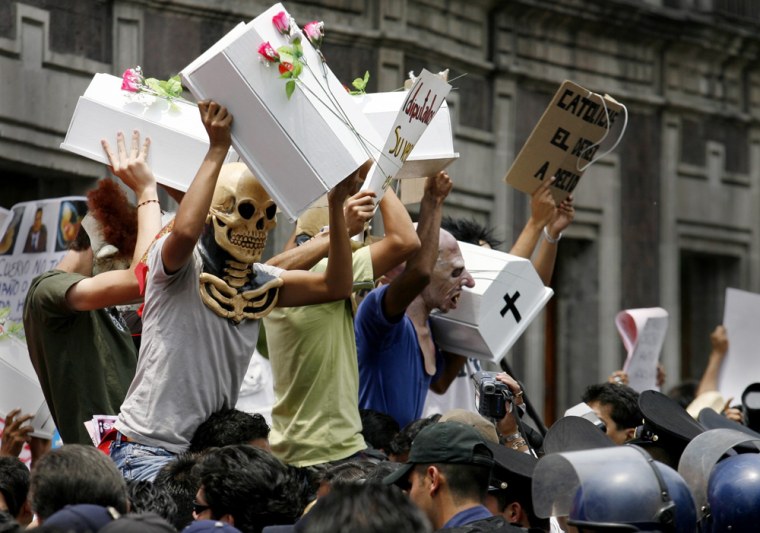Mexico City lawmakers voted to legalize abortion Tuesday, a decision likely to influence policies and health practices across Mexico and other parts of heavily Roman Catholic Latin America.
The proposal, approved 46-19, with one abstention, will take effect with the expected signing by the city’s leftist mayor. Abortion opponents have already vowed to appeal the law to the Supreme Court, a move likely to extend the bitter and emotional debate in this predominantly Catholic nation.
“Decriminalizing abortion is a historic triumph, a triumph of the left,” said city legislator Jorge Diaz Cuervo, a leftist social democrat who voted for the bill. “Today, there is a new atmosphere in this city. It is the atmosphere of freedom.”
Nationally, Mexico allows abortion only in cases of rape, severe birth defects or if the woman’s life is at risk. Doctors sometimes refuse to perform the procedure even under those circumstances.
The new law will require city hospitals to provide the procedure in the first trimester and opens the way for private abortion clinics. Girls under 18 would have to get their parents’ consent.
Criminal penalties after 12 weeks
The procedure will be almost free for poor or uninsured city residents, but is unlikely to attract patients from the United States, where later-term abortion is legal in many states. Under the Mexico City law, women having an abortion after 12 weeks face punishment of three to six months in jail. Those performing abortions after that period would face one to three years in jail.
Mexico City is dominated by the leftist Democratic Revolution Party, at odds with President Felipe Calderon’s conservative National Action Party, which opposed the abortion measure.
“We go to great lengths to protect (sea) turtle eggs,” said city lawmaker Paula Soto, a member of Calderon’s party. “Lucky turtles! It appears they have more people willing to defend them than some unborn children.”
The law alarmed Calderon’s party and prompted authorities to send ranks of riot police to separate chanting throngs of opposing demonstrators outside the city legislature.
A crowd of abortion-rights supporters chanting “Yes, we did it!” gathered at a monument to 19th-century anti-clerical reformer Benito Juarez in downtown Mexico City after the vote.
“I feel happy, because this is a step forward, not backward, for a woman’s right and freedom to choose ... about her body and her life,” said demonstrator Gabriela Cruz, 36.
The Roman Catholic church has protested the measure and Mexico City Cardinal Norberto Rivera led a march through the capital last month in opposition. The Archdiocese said Tuesday that it would “evaluate the moral consequences of the reforms” and said Rivera would have no public comment on the vote until Sunday.
The only countries in Latin America and the Caribbean with legalized abortion for all women are Cuba and Guyana. Most others allow it only in cases of rape or when the woman’s life is at risk. Nicaragua, El Salvador and Chile ban it completely.
The New York-based Center for Reproductive Rights, the legal arm of the reproductive rights movement globally, applauded the Mexico City law as “historic.”
“This will serve as a model to get abortion accepted not only nationwide, but also in Latin America and the Caribbean, where women who interrupt their pregnancies are still sent to jail,” said activist Elba Garcia, 24, who rode a flatbed truck in an abortion rights caravan through downtown Mexico City on Monday.
Emotional confrontation
Recent newspaper polls showed that a majority of Mexico City residents support legalized abortions, at least in the first weeks of pregnancy.
The proposal has created an emotional confrontation in a country where the majority of people are Roman Catholic.
Calderon has opposed the proposal, and church leaders have led protests that pushed the limits of Mexico’s constitutional ban on political activity by religious groups.
Opponents argue that life begins at conception and say the law would violate the Mexican Constitution’s protection of individual rights. Supporters say the law would save the lives of thousands of women.
The city and its suburbs are home to about one-fifth of the country’s population, and many Mexicans travel to the capital for medical treatment. Opponents fear the local law could attract women across Mexico seeking abortions.
An estimated 200,000 women have illegal abortions each year in Mexico, based on the number who show up at hospitals later seeking treatment for complications, said Martha Micher, director of the Mexico City government’s Women’s Institute.
Botched abortions using herbal remedies, black-market medications and quasi-medical procedures kill about 1,500 women each year and are the third-leading cause of death for pregnant women in the capital, Micher said.
